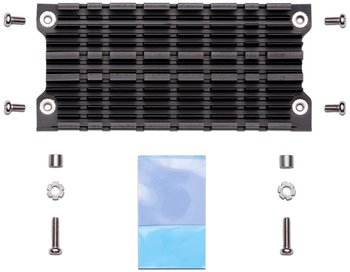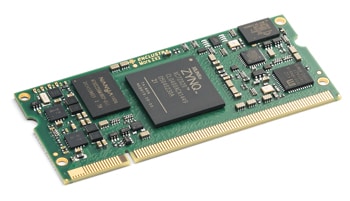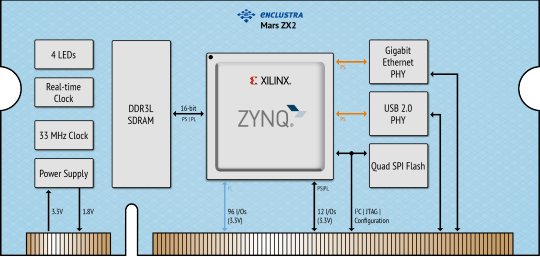Overview
The Mars ZX2 System-on-Module (SOM) / system-on-chip (SoC) module combines Xilinx’s Zynq-7010/7020 All Programmable SoC device with fast DDR3L SDRAM, quad SPI flash, a Gigabit Ethernet PHY and an RTC and thus forms a complete and powerful embedded processing system.
The SO-DIMM form factor allows space-saving hardware designs as well as quick and simple integration of the module into the target application.
The Mars ZX2 SoC module reduces development effort, redesign risk and improves time-to-market for your embedded system.
Highlights
- Built around Xilinx’s Zynq-7010/7020 All Programmable SoC
- Combines the flexibility of a CPU system with the parallel processing power and real-time capabilities of an FPGA system
- Supports analog differential inputs
- Available in industrial temperature range
- Supports USB 2.0, CAN and Gigabit Ethernet
- Linux BSP and tool chain available
- Powerful and compact FPGA board
Benefits
- A complete and powerful embedded processing system in the industry-standard SO-DIMM form factor
- Simple, low cost and yet rugged assembly
- Simple and low-cost integration due to the on-board standard interfaces (USB, Ethernet, CAN)
- High-bandwidth program and data memory due to the high-performance hard-macro memory controller
- Lowest power consumption due to the high-efficiency DC/DC converters
Features
- Xilinx Zynq-7010/7020 AP SoC in the CLG400 package (XC7Z010/XC7Z020)
- ARM® dual-core Cortex™-A9
(32 bit, up to 766 MHz) - Xilinx Artix™-7 28nm FPGA fabric
- ARM® dual-core Cortex™-A9
- SO-DIMM form factor (67.6 x 30 mm, 200 pins)
- 108 user I/Os
- 12 ARM peripheral I/Os (SPI, SDIO, CAN, I2C, UART) shared with FPGA I/Os
- 96 FPGA I/Os (single-ended, differential or analog)
- Gigabit Ethernet and USB 2.0 OTG PHYs
- Up to 1 GB DDR3L SDRAM
- 64 MB quad SPI flash
- 3.3 V tolerant inputs
- Single 3.3 V supply voltage
Module Architecture
Click image to enlarge
Not all features are available simultaneously – please check the documentation for any applicable constraints.
All specifications are subject to change without notice. Please verify component specifications with vendor’s datasheets.
Enclustra maintains an errata and revision history document for each product. Please also check the errata of the FPGA device and other components.
Product Selection Matrix
| Product Code | FPGA | DDR3L SDRAM | Quad SPI Flash | Temp Range | Status |
|---|---|---|---|---|---|
| MA-ZX2-10-2I-D9 | XC7Z010-2CLG400I | 512MB | 64MB | -40 to +85C | |
| MA-ZX2-20-2I-D9 | XC7Z020-2CLG400I | 512MB | 64MB | -40 to +85C |
Key: ![]() Mass Production
Mass Production ![]() Sampling
Sampling ![]() Contact us
Contact us
Mars Heatsink

The Mars heat sink is an optimal solution to cool the Mars AX3 – it’s low profile (less than 7 mm tall) and covers the whole module surface. It comes with a gap pad for the FPGA and four screws to attach it to the module PCB. With additional user configured gap pads, it is possible to cool other components on board as well.
To cool the module even further, a mounting slot in the center of the heat sink makes it easy to attach fans of different sizes – see the technical drawing for details.
Base Boards
| Base Board | Description |
|---|---|
| Mars ST3 | An ideal platform for display applications |
| Mars EB1 | An ideal platform for a stereo frame grabber and other video applications. |
| Mars PM3 | A powerful platform with a wealth of I/O interfaces: Ethernet, USB 3.0, FMC low pin count and more. |
Operating System Support
OS | Details | Availability | Partner |
|---|---|---|---|
 Linux | BSP support for: | Available Now | |
VxWorks | BSP support for: | Contact NetModule for more information |  |
Target Applications
- Embedded Computing
- Data Acquisition
- High-Speed Communications
- Drive/Motion Control
- Digital Signal Processing
- Image Processing
Related Products
- Mars ST3 Base Board
- Mars PM3 p-ITX Base Board
- Display Controller IP Core
- Mars EB1 Base Board
- Universal Drive Controller IP Core
- Advanced Velocity Estimator IP Core
Information on the product may change, please check the manufacturers website and page for the most up to date information, see the link at the top right of this page.






